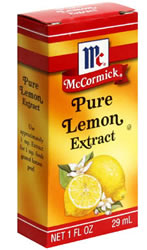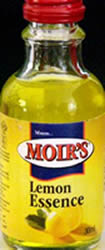Difference between Lemon Essence and Lemon Extract
Key difference: Lemon extract is created by soaking lemon peel in an alcohol, usually ethyl alcohol. This infuses the alcohol with the lemon flavor. An essence, on the other hand, can have two distinct meanings. It can either be an imitation extract or it can be highly concentrated form of pure extract.
 Essence and extract are both flavoring ingredients. Both are mainly used in a number or recipes to give them the flavoring and/or aroma of the original ingredient.
Essence and extract are both flavoring ingredients. Both are mainly used in a number or recipes to give them the flavoring and/or aroma of the original ingredient.
Dictionary.com defines an extract as a substance separated or obtained “from a mixture by pressure, distillation, treatment with solvents, or the like.” While, as essence is “a substance obtained from a plant, drug, or the like, by distillation, infusion, etc., and containing its characteristic properties in concentrated form.”
While referring to food ingredients, an extract is made by combining oil from the ingredient with an alcohol. This creates a stable, longer-lasting flavoring agent. Alcohol is used as a binding agent for preserving the flavor’s strength. Ethyl alcohol and vodka are commonly used to make extracts, while, alcohols such as gin, brandy and rum may also be used.
Lemon extract is created by soaking lemon peel in an alcohol, usually ethyl alcohol. This infuses the alcohol with the lemon flavor. While incorporating the lemon extract in a dish, the alcohol tends to evaporate during the cooking or baking, leaving behind the lemon aroma and a slight lemon taste, which is not overpowering.
However, the lemon extract does not have a taste as strong as the original lemon juice. The added benefit of using lemon extract as opposed to lemon in cooking and baking is that the lemon extract tends to provide the flavor of lemon without the citric acid of the lemon juice. This is especially helpful for while making desserts, as the acid and the bitterness of lemon would otherwise conflict with the required sweet taste of the dessert.

An essence, on the other hand, can have two distinct meanings. It can either be an imitation extract or it can be highly concentrated form of pure extract; the label on the bottle should specify which. Concentrated essences are essentially very strong extracts that can be twice to even four times as strong as normal extracts.
Whereas, imitation essences are chemically created substances that aim to replicate the flavor and/or taste of the original ingredient. These imitation essences usually do not have the delicacy of the natural flavor; however they provide a close enough alternative that is more convenient then actual ingredients or extracts, especially when the ingredients or extracts are not easily available or are too expensive. Essences also tend to store better and longer than the original ingredient.
Lemon essences, on the other hand, are usually imitation extracts that produced via esters, usually ethyl acetate and ethyl butyrate. These esters tend to mimic the taste and smell of the ingredient, in this case, the lemon.
Still, many people find that imitation lemon essence tends to have an artificially produced taste that does not match with the original taste of the lemon or with pure lemon extract. These people recommend using lemon juice, lemon zest, or lemon rind, even though preparing these are more time consuming than using pure lemon extract or lemon essence out of a bottle.
Moreover, at times imitation essences tend to be weaker than natural extracts. Hence, many people recommend doubling the amount of imitation essence used as opposed to lemon extract.
Image Courtesy: meijer.com, africashop.com.au









Comments
I am wondering where I can order lemon essence. I have been to supplement stores and health food stores, but cannot find it.
Judith Hay
Tue, 04/29/2014 - 23:49
Add new comment